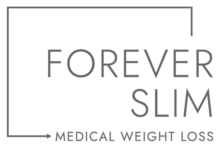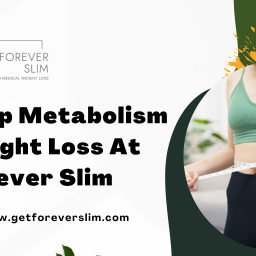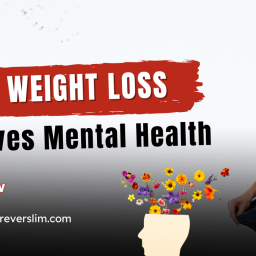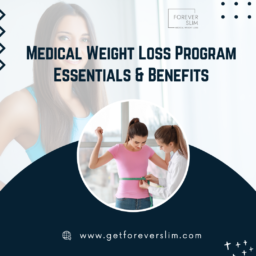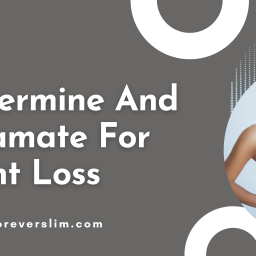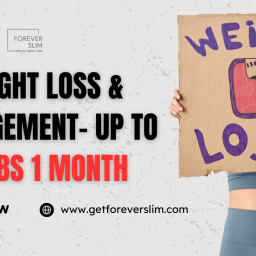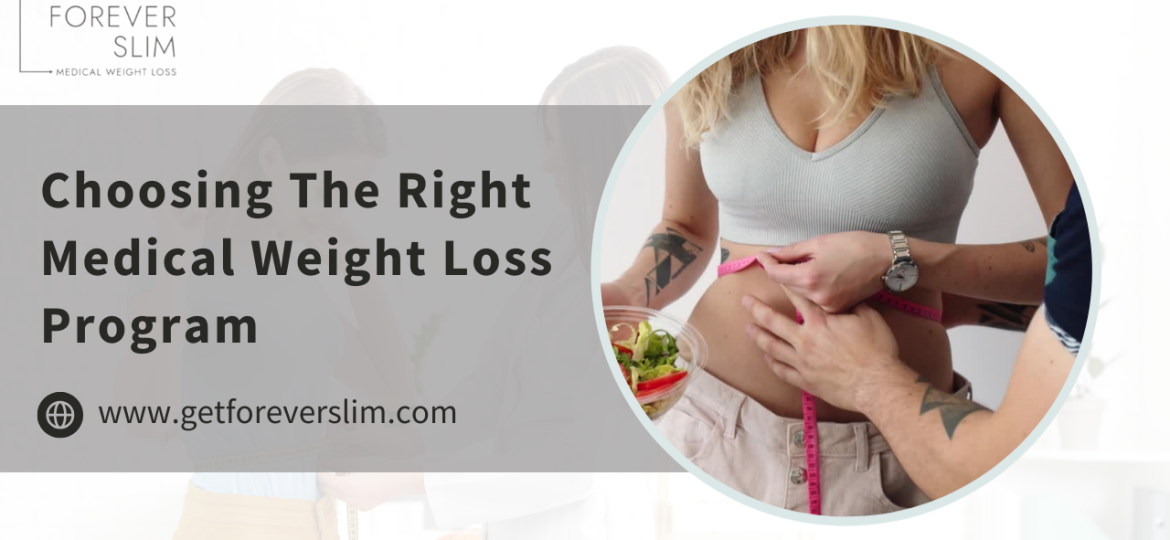
Choosing a Weight Loss Program if You are Obese
A weight-loss program is a comprehensive program that provides you with ongoing guidance and support to build healthy lifestyle habits that promote weight loss.
If you’re obese, losing weight may prevent or reduce weight-related problems, such as high blood pressure, heart disease, and diabetes. Losing excess weight when you’re obese improves the overall quality of your health and life.
A typical weight loss program includes a healthy, reduced-calorie diet and exercise plan. If an individual gets expert guidance and support from loved ones, sticking to the adopted healthy lifestyle habits and keeping the lost weight off becomes much easier.
With so many weight loss program options available, deciding which program will work for you can be challenging.
To choose the right program, consult your health care professional or a weight management specialist. You should also evaluate recommendations yourself. Check each program’s approach to weight loss and how you feel it can benefit you in achieving your weight-loss goals.
How to Choose the Best Weight Loss Program For You
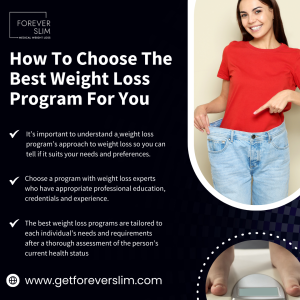
Consider The Program Approach
It’s important to understand a weight loss program’s approach to weight loss so you can tell if it suits your needs and preferences. The program should address and emphasize healthier eating habits, increased physical activity, lifestyle modifications, and mental strategies that encourage weight loss.
Look For Programs With Experience Professionals
Choose a program with weight loss experts who have appropriate professional education, credentials and experience.
Opt For Personalized Programs
The best weight loss programs are tailored to each individual’s needs and requirements after a thorough assessment of the person’s current health status, needs, goals, resources, and physical and emotional challenges.
Choose Programs That Offer Follow-up and Long-term Support
Weight loss can be tiring, especially without a good support system. Work with friendly professionals who care about you and support you.
Check If The Program Combats Your Bad Habits
The best weight loss program is one that doesn’t make you feel like you are on a diet. It shouldn’t feel like you’re forced to do away with the food you love, as this can create an obsession with food and heighten cravings. Opt for programs that help you identify habits that can keep you from achieving a healthy weight.
If you’re the type that snacks mindlessly when watching movies or eating while cooking for your family, you should choose a weight loss program that will give you tips and ideas on how to break these habits.
What To Avoid When Choosing Weight Loss Plans
While all weight-loss programs can sometimes provide exceptional success stories, it is important to understand the typical results. Avoid programs that overpromise or exaggerate. If a weight-loss program consistently helps people lose approximately 10 per cent of body weight, you can consider such a program.
Avoid programs that are dependent only on dietary supplements, weight-loss agents, or medications rather than combining healthy diets with exercise and weight-loss medications.
Avoid weight loss programs that promote costly tests. Extensive lab studies and other diagnostic testing, such as full body imaging scans to measure body fat, are usually not essential for weight loss programs.
How to Know If Medical Weight Loss Is the Correct Choice
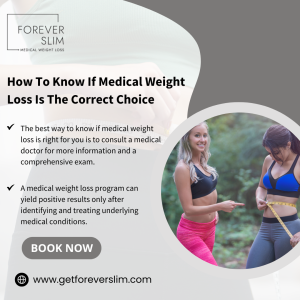
The best way to know if medical weight loss is right for you is to consult a medical doctor for more information and a comprehensive exam. A medical weight loss program can yield positive results only after identifying and treating underlying medical conditions.
Following the initial exam, you will be coached toward achieving long-term success if medical weight loss is right for you. This may include prescribing appropriate medications for underlying health conditions and weight loss.
When Medical Weight Loss Is Not A Good Fit
Medical weight loss programs aren’t for everybody. A person who wants to lose some weight for a social outing is not a good candidate for medical weight loss.
An overweight person who wants to lose weight and build muscle or endurance for a once-in-a-lifetime feat like a triathlon or scaling a challenging rock formation is also not a good fit for medical weight loss. Such a person needs a weight loss approach focusing on building muscle and strength.
When to Choose Medical Weight Loss
Experts recommend you choose medical weight loss when you;
- Are overweight or obese and need medical care for conditions caused by or worsened by your excess weight.
- Have an underlying problem such as depression, thyroid disorders, or hormonal imbalance responsible for the excess weight.
- Have a medical condition such as hypertension, heart disease, or sleep apnea and need a weight loss regimen that a medical professional oversees.
- Have tried other weight loss programs but haven’t had good results.
7-day Diet Plan For Weight Loss
Day 1
Breakfast: Steel-cut or old-fashioned oatmeal with water, skim milk and blueberries.
Lunch: Quesadilla made with two small corn tortillas, low-sodium black beans, low-fat jack cheese, and diced watermelon.
Dinner: Turkey burger, roasted cauliflower and broccoli florets. Brown rice and spinach salad with balsamic vinaigrette.
Day 2
Breakfast: Baked Banana-Nut Oatmeal Cups and apples.
Lunch: Veggie & Hummus Sandwich and banana
Dinner: Sheet-pan chicken Fajita Bowls with cooked brown rice.
Day 3
Breakfast: whole-grain toaster waffle with nut butter and berries.
Lunch: Salad made with baby spinach, grilled chicken, dried cranberries, avocado, slivered walnuts, and vinaigrette
Dinner: Lean pork tenderloin cut into bite-sized pieces stir-fried with onions, garlic, broccoli, and bell pepper, brown rice, tomato slices, light soy sauce, and rice wine vinegar.
Day 4
Breakfast: Whole-grain English muffin toast with nut butter and sliced banana.
Lunch: Sliced turkey breast, tomato-cucumber salad, sliced cucumber, and vinaigrette dressing.
Dinner: Spinach Ravioli with Artichokes and Olives.
Day 5
Breakfast: Chickpea and potato hash and blueberries.
Lunch: A wrap made with thinly sliced lean roast beef, a whole wheat tortilla, shredded lettuce, medium tomato slices, horseradish, and Dijon mustard.
Dinner: Lemony-Garlic Pan-Seared Salmon and Feta, Kale & Pear Salad
Day 6
Breakfast: Low-fat plain strained Greek-style yogurt, chopped pecans, peanut butter-Oat Energy Balls and medium apple.
Lunch: Chicken & Spinach Salad with Creamy Feta Dressing
Dinner: Spaghetti with Creamy Lemon-Spinach Sauce
Day 7
Breakfast: Muesli with Raspberries
Lunch: Serving Chipotle-Lime Cauliflower Taco Bowls
Dinner: Chicken & Cucumber Lettuce Wraps with Peanut Sauce
Essential Checklist for Starting a Weight Loss
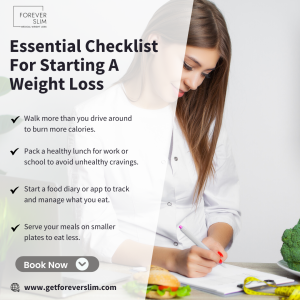
If you’re about to start your weight loss journey, here’s an important checklist to keep you on track.
- Write down your reasons for wanting to lose weight on a piece of paper and place it where you’ll see it daily.
- Walk more than you drive around to burn more calories.
- Don’t forget to eat breakfast daily so you won’t get too hungry later in the day and overeat.
- Pack a healthy lunch for work or school to avoid unhealthy cravings.
- Start a food diary or app to track and manage what you eat.
- Weigh yourself daily to track your weight loss and celebrate your little wins.
- Eat only when you’re really hungry. Don’t eat it because you’re stressed or bored.
- Serve your meals on smaller plates to eat less.
- Replace high-calorie, sugary drinks with water.
FAQ
How do you qualify for weight loss medication?
Weight loss medications are prescription medications for people who are obese or overweight. You have to qualify as one to get the prescription.
If your BMI is equal to or greater than 30 or equal to or greater than 27 with one or more obesity-related conditions, you qualify for a weight loss medication prescription. You can also get a prescription if you have not been able to lose at least 5% of your total body weight in three to six months with lifestyle changes alone.
What is the most successful weight loss rate?
The most successful weight loss rate is losing 1 to 2 pounds (0.5 to 1 kilogram) weekly. Generally, you need to burn 500 to 1,000 calories more than you consume daily to lose 1 to 2 pounds a week. You can achieve this with weight loss medication, a lower-calorie diet, and regular physical activity.
What is the newest weight loss injection in 2024?
The newest weight loss injection is Zepbound (Tirzepatide). The FDA recently approved this injection, which will most likely become popular in the US and other parts of the world. It functions by mimicking the action of GLP-1 and GIP.
Get the Best Weight Loss Program at the Best Clinic in Little Elm, TX: Forever Slim
Forever Slim is the best weight loss clinic offering one of Little Elm’s best weight loss programs. We offer expert guidance and personalized weight loss programs.
We walk closely with you throughout your weight loss journey to ensure you achieve your goals. We will discuss your goals during your consultation session. We also offer long-term support and guidance to help you maintain your new healthy body weight.
Contact us today or book a consultation session to get the best weight loss program tailored for you at Forever Slim.
